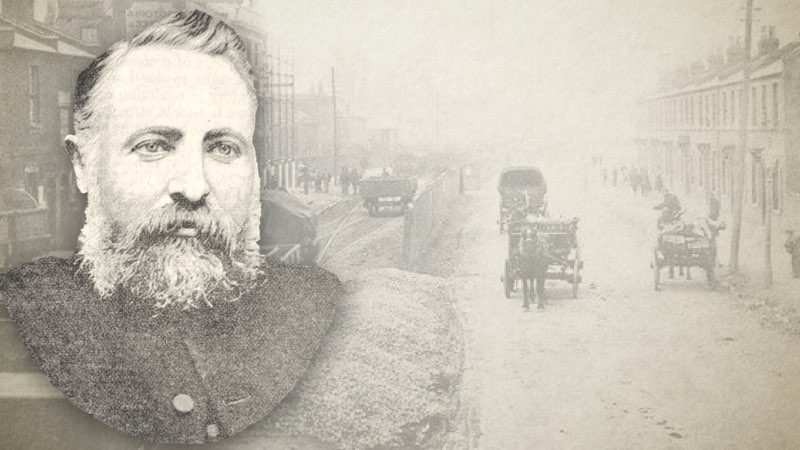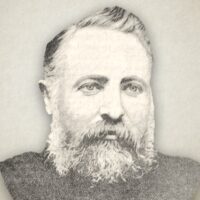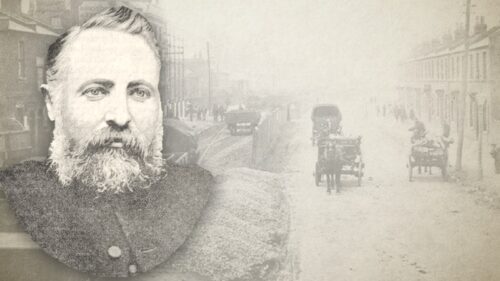
The Life And Testimony Of Edwin White
Earthen Vessel 1891:
Mr. E. White (Formerly Of Clare, Suffolk), Pastor, Enon Chapel, Woolwich, Kent
I was born in a quiet rural village named Fringford, in the heart of Oxfordshire, in the month of August, 1846. My parents were upright, moral people, members of the Church of England, in which I was brought up, and was carefully taught her catechisms and ceremonies, and my teachers laboured to instil into my youthful mind that this was the only true religion, and that schism from the Church was an awful sin. These notions I largely imbibed and looked upon dissenters with supreme contempt. There were a few Methodists in the village. But my young mind even then was not quite satisfied. At times I had convictions and longings to be better than I was, though I never heard from my teachers one word about the need of a new heart and salvation alone through the merits of Christ. If I was christened, confirmed, kept to the Church, did not do anything glowingly wrong, all would be well. But conscience spoke loudly at times. I had a dream one night when quite a child that the judgment day had come. I saw the heavens opened, and the white throne set, and the Judge descending. With this I awoke in such terror; my father was obliged to come into my bed and stay with me the remainder of the night. Being rather delicate as a child I was often at home from school, and spent much time in reading, borrowing all the books I could get from the neighbours.
When I was ten years of age I had to commence work. After I had been at work a year I was taken very ill with low fever, which brought me down to the borders of the grave. I can well remember my dear mother carrying me downstairs like a babe. When I got a little better I was so weak and wasted. While I was slowly regaining strength some friend lent me a book called “Pike’s Early Piety.” I have never come across the book since, but the impression it made upon me I shall never forget. It gave the lives and the happy deathbeds of many godly young people. Ah, how I longed to be like them. I did not wish to get better, but I wanted to be made good like them, and then go to heaven. But with returning strength these feelings gradually began to subside, though, at times, they would return with great force again. After this illness I became stronger physically than I had ever been before. I soon became as rough and wicked as any boy my age.
Having a pretty good voice, and being fond of singing, I became a member of the village choir, the clergyman promising me that if I would keep to the Church and choir, he would eventually get me a situation where I might do better in life.
Thus, when I was 17 years of age, he put an advertisement in a clerical paper strongly recommending me. Answers came, and I was on the point of going into Yorkshire, when a letter came from a clergyman at St. Paul’s Cray, Kent, and it was decided I should go there. I was with him upwards of three years, and was in his Church choir; often going, morning and evening on the Lord’s day, with my fellow-singers straight to the public-house after the service in the Church, never thinking for one moment that we had been singing the praise of God. I left my employer rather suddenly, as he was going to the sea-side for some months, and had let his house. I might here say I rode miles with him, but he never once spoke to me about my soul, only about confirmation. I heard that a man was wanted at St. Paul’s Cray paper-mills; I thought I would try and go in there for a few days until I got another situation. I obtained employment and stayed there 14 years, until I went into the ministry, leaving as the foreman of the department in which I entered as a workman.
After I had left the clergyman I still attended his Church for some time. I had married, and we had our first child duly christened. Before the birth of the second, I had begun to feel those intense longings for a better life which I often felt in my boyhood. I attended the services of the Church with greater regularity, following very devoutly in all the responses, listening very earnestly to the sermon; but it all gave me no satisfaction. I tried to live a holy life, and keep all God’s commandments, and sometimes thought I was getting better, when something would provoke me, and my structure of holiness was shattered to ruins. I did not know what to do. I felt there was something I wanted and must have, but where to get it I knew not. All my Church-going had failed me; my personal efforts after goodness had all failed. What could I do? Where could I look for rest and satisfaction? With much reluctance I thought I would go to the Temple Congregational Church, St. Mary Cray. I had great prejudice against Dissenters, but felt I must go somewhere. I had such an aching void in my breast. I attended there a few Sunday evenings, but the congregation all looked so happy, and I felt so miserable, I thought I have no business here; these people are all good and happy. I had begun to feel I was a sinful wretch as well as an unhappy man. I had begun to read my Bible in secret when my wife was gone to bed, and fall on my knees and try to pray; but I felt more miserable and farther off than ever from what I wanted.
I attended the Wesleyan Chapel one evening. I thought perhaps I might hear something there to help me, but all was in vain. The next Sunday evening I stood in the street, undecided where to go, when one of the female members of Foots Cray Baptist Chapel came out of her house, and, seeing me standing, invited me to go with her. I went. What the preacher’s text was I cannot tell now, but the deacon shook me warmly by the hand on leaving the chapel, and hoped I should come again, though I was an entire stranger to him. I went home determined to go again next Sunday. In the week my misery came back upon me with tenfold force, until one day I left my work, went down to the riverside below the mill and threw myself down on the bank and prayed and groaned in my wretchedness. While I was sobbing and praying, it seemed as though an audible voice uttered these words, “Come, now, and let us reason together, saith the Lord; though your sins be as scarlet they shall be as white as snow.” I started to my feet and looked all around, thinking someone had followed me. I went back to my work. I asked the man who worked close by me if anyone had left their place since I had been out, and he replied in the negative. I began to think the Lord must have spoken the words, and this gave me a little comfort.
The next Lord’s-day evening I went again to Foot’s Cray. Mr. Bloom was supplying the pulpit that day. His text was, “Ye must be born again;” and, as he spoke of the necessity of the new birth, its nature and its evidence, I felt this is where all is wrong with me, I am not born again. And the following week I was more intensely wretched than ever, so much so that I was unable to work. I went to the doctor; and declared on my club. On Thursday morning I went home: my wife was out; I was alone in the house. What I passed through during the following three days no tongue can tell. I wept, I prayed, I turned to the Word of God. I paced the room in anguish, I rolled on the floor in the agony of my mind. On Saturday evening I grew more calm, though my burden still remained. On Sunday morning I hurried to the doctor that I might get off my club to attend chapel at night, which I did. Mr. Ray announced there would be a prayer-meeting at his house on Tuesday evening at Paul’s Cray. I got behind the people and crept in on Tuesday night in one corner of the large kitchen. But when he called upon one after another to pray, calling them brother, all my wretchedness came back again. I felt these men can talk familiarly to God as their Father, they call one another brother, but I am a poor outcast, God frowns upon me. These people would not let me be here if they knew what a vile wretch I am; but I felt if they would let me I must come again.
On the Saturday following, I think, a man in St. Paul’s Cray died suddenly. At night I was watchman at the mill alone; I shall never forget the night I spent; I felt if I had been thus ushered into eternity I must be lost. I determined to attend the chapel in the morning as well as night. I remember a sermon from the text, “I have laid help on one who is mighty,” by a Mr. Jaffery, gave me great comfort. Another Sunday morning they sang that hymn:—
“Awake, my soul, in joyful lays.”
When they sang that verse:—
“He saw me ruined in the fall,
Yet loved me notwithstanding all,”
I asked myself, Can it be possible that God loves me in spite of my sinfulness? and a ray of hope sprang up in my breast. Soon after that the Lord showed His pardoning love and the finished work of Jesus for my soul so clearly that my joy was as great as my misery had been before. I sat up in the bed one night and sang with delight, greatly to the discomfort of my dear wife then; but the time came when I had to join with her over pardon felt in her soul to praise our blest Redeemer. But now sprang up another difficulty. I began to question what right have these ministers to preach whom I have been hearing? Am I not committing sin by leaving the Church? Where do these men get their credentials from? Are they properly ordained? I asked my wife, who had been a Sunday scholar at Foot’s Cray. She told me all Baptist ministers and members were baptized. I told her I had been baptized, but she told me they would not consider my baptism Scriptural. Then she explained the mode of believers’ baptism. I had never heard of such a thing before, and I said,”Well, I have been warned from infancy to have nothing to do with Dissenters, as they are very wrong in their fanatic ways, and now I see they are.” My wife said, though we had our child christened, there was no warrant for it in Scripture, only she said nothing about it at the time as she knew I was a Churchman. But I felt that all the venerable bishops and learned men of the Church of England could not be wrong. I would take the Bible and search for myself, and soon refute these foolish notions of the Baptists. So I searched the New Testament through to support infant sprinkling, but could not find one text to help me, but I found plenty which spoke of believers’ baptism. I began to think, are the Baptists right after all? No, it cannot be; I will search the Scriptures more carefully. And this matter became a source of intense anxiety to me. I prayed to be led right. I longed for some books on Baptist principles, but had none. I wished the ministers would explain it from the pulpit, but no one did, so I kept on studying the Word.
We expected the birth of another child, and I felt if I should not have this child christened, and it was to die and be lost, what a terrible thing; the fear haunted me day and night. Yet my convictions about infant sprinkling being very good had received a severe shock. I prayed more earnestly about it, until God showed me from His Word alone that believers’ baptism by immersion was the only true and Scriptural baptism. Thus, without one word of help from man, I was led to see baptism.
Another young man at that time who went to Foot’s Cray, said, in my hearing, he would like to be baptized. We agreed to speak to Mr. May on the Tuesday following, at his house, about joining the Church. I told my wife when I returned home what we had done. She said, “I thought you were going to prove the Baptists wrong. But I hope you will never do anything to disgrace the profession you are about to make, and I will never put a stumbling-block in your way.” We came before the Church in due course. I was very nervous, and could say but little. Old Mr. Fremlin presided at the Church meeting. The members told me, years after, he said I should say a great deal for my Master before I died. My companion could say a great deal more than I. We were baptized on the first Lord’s-day in April, 22 years ago, and received into the Church the same day. Through mercy I have been upheld till now. The last I heard of my companion he was in a lunatic asylum in Warwickshire, and I am here—
“A monument of grace,
A sinner saved by blood:
The streams of love I trace
Up to the fountain of God,
There in His sacred bosom see
Eternal thoughts of love to me.”
Edwin White (1846-?) was a Strict and Particular Baptist preacher. His first pastorate was with the church meeting at Orphington (1877-1879). After two years, the communion question cropped up, the majority of members deciding to throw the Table open. He forthwith resigned his office. His second pastorate was with the church meeting at Clare, Suffolk (1881-1887). After six years of blessed ministry, he resigned the office due to health reasons. His third pastorate was with the church meeting at Woolwich, Enon Chapel (1891-1919). In 1911 was elected president of the Metropolitan Association of Strict Baptist Churches.




